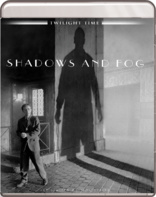Shadows and Fog Blu-ray Movie
HomeShadows and Fog Blu-ray Movie 
Limited Edition to 3000Twilight Time | 1991 | 86 min | Rated PG-13 | Nov 10, 2015
Movie rating
6.5 | / 10 |
Blu-ray rating
| Users | 0.0 | |
| Reviewer | 3.5 | |
| Overall | 3.5 |
Overview
Shadows and Fog (1991)
With a serial strangler on the loose, a bookkeeper wanders around town searching for the vigilante group intent on catching the killer.
Starring: Woody Allen, Kathy Bates, John Cusack, Mia Farrow, Jodie FosterDirector: Woody Allen
| Period | Uncertain |
| Comedy | Uncertain |
| Crime | Uncertain |
| Mystery | Uncertain |
Specifications
Video
Video codec: MPEG-4 AVC
Video resolution: 1080p
Aspect ratio: 1.85:1
Original aspect ratio: 1.85:1
Audio
English: DTS-HD Master Audio Mono (48kHz, 24-bit)
Music: DTS-HD Master Audio 2.0 (48kHz, 24-bit)
Subtitles
English SDH
Discs
25GB Blu-ray Disc
Single disc (1 BD)
Playback
Region free
Review
Rating summary
| Movie | 3.0 | |
| Video | 3.5 | |
| Audio | 4.0 | |
| Extras | 1.0 | |
| Overall | 3.5 |
Shadows and Fog Blu-ray Movie Review
An uncommon confusion.
Reviewed by Jeffrey Kauffman November 20, 2015The dictionary definition of neurosis typically runs something like:
Mild mental illness involving symptoms of stress, and often including excessive and irrational anxiety or obsession.Woody Allen typically plies neurotic waters in his films, quite often with regard to the characters he himself plays in them. But Allen’s sadsack men are typically neurotic about picayune matters of everyday life as well as overarching metaphysical aspects. In an ironic way, these exhibitions of various neuroses are based upon an essentially rational understanding of the world (despite that above definition), at least insofar that Allen’s characters often sense that there’s a baseline of normalcy available to them, if only they could push through the mishegos that fate or some Divine Presence has thrust in their way like some kind of galactic obstacle course. What, then, to make of a neurotic who exists in a completely irrational, indeed Kafkaesque, environment, where nothing really tends to make much sense and the forces of chaos are so rampant as to make any attempt to carve “meaning” out of existence a largely laughable enterprise? That’s just one of the problems confronting not just Kleinman, the character Allen plays in Shadows and Fog, but any audience member coming to the film itself. This 1991 outing was Allen’s homage to Abstract Expressionism, and it blends a number of cinematic referents, including everything from M to Nosferatu to films not generally thought of as being within the German Abstract Expressionist movement, like The Phantom Carriage, all within a context which recalls the labyrinthine excesses of such Kafka outings as The Trial. But because this is Allen in his quasi-dramatic mode, Ingmar Bergman and Federico Fellini can’t be very far away, and in this particular instance, it’s probably the Bergman of Sawdust And Tinsel and the Fellini of La Strada, for Shadows and Fog just so happens to also include a story involving various circus folks and their marital discord. The film is visually arresting for its entire running time, but from a story standpoint is often problematic. Allen’s typically fine ear for dialogue also tends to fail him throughout this film, and Shadows and Fog has some extremely stilted moments as a result.
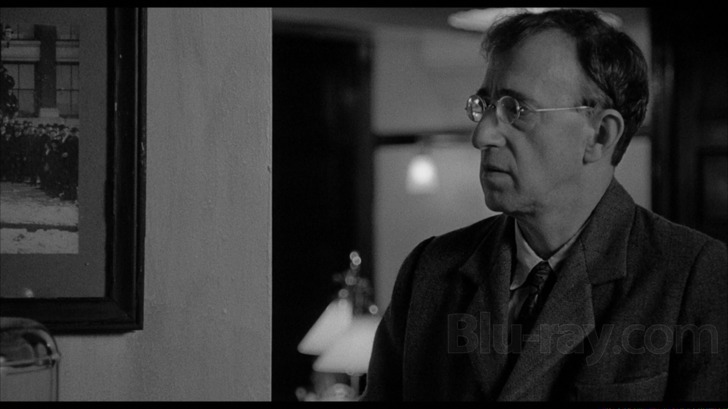
While perhaps not at the consternation levels of, say, Kafka's Gregor Samsa, who after all did awaken to find himself transformed into a giant bug, Kleinman is similarly rudely brought out of a deep sleep as Shadows and Fog gets underway, courtesy of a horde of vigilantes who burst into his room and insist he get ready to take his place in “the plan”, an amorphous strategy which is never completely (or frankly even partially) defined, in typical Kafkaesque manner. “The plan” has to do with bringing a serial killer to justice, and in fact Shadows and Fog has already shown the first murder, with imagery that none too subtly recalls the efforts of Fritz Lang, F.W. Murnau and/or Victor Sjöström.
The whole mad killer on the loose angle turns out to be a rather odd McGuffin that tends to provide the plot with a certain momentum, but which doesn’t really inform it any meaningful way, as evidenced perhaps most strongly by the film’s ending, where things pretty much literally disappear into thin air, in a cinematic equivalent of “out of sight, out of mind”. Instead, Shadows and Fog trades more explicitly on a palpable mood and the interactions of a typically overstuffed roster of supporting players.
The circus couple is comprised of sword swallower Irmy (Mia Farrow) and her two timing husband, a clown (no, really) named Paul (John Malkovich). Paul has eyes for the circus’ trapeze artist Marie (Madonna), even though Marie’s husband is a potentially dangerous strong man who is fortunately a deep sleeper. When Irmy catches Paul close to being in flagrante delicto with Marie, she snaps and leaves the circus, walking the isolated cobblestone streets alone at night, at least that is until she bumps into a local “working girl” (played by Lily Tomlin) who invites Marie back to the relative safety of the whore house, where she’ll at least hopefully be sequestered from any serial killers if not from the advances of the everyday males who frequent the establishment. Those guys include a student named Jack (John Cusack), who develops an instant obsession for Irmy and offers her a large sum to sleep with him. (This is yet another Allen film that posits Farrow’s character as having an ineluctable seductive quality, something that those who find the actress a bit on the mousy side may have a hard time buying into.)
Meanwhile Kleinman (literally “little man”, an obvious reference to the typical metaphysical standing of an Allen character) has gone out looking for the posse, which has conveniently disappeared into the night mists. He instead interacts with a kind of mad doctor (Donald Pleasance), a mortician involved in some kind of experimenting which ultimately brings him face to face (and piano wire) with the film’s killer. When the doctor is found dead, a clue will perhaps incriminate Kleinman, leading to typical Allen tic filled reactions. Luckily Kleinman at least has the good fortune to meet up with Irmy, who’s been arrested when the whore house gets raided by the cops.
Even this précis doesn’t address all of Shadows and Fog’s many nooks and crannies, not to mention its huge supporting cast (which also features the likes of Kathy Bates, Jodie Foster, and Kenneth Mars among many others), but in a way that doesn’t matter, for as with many Abstract Expressionist outings, it isn’t what happens that’s so important but more the way it feels. As Kleinman and Irmy wend their way through a variety of mishaps and semi-adventures, the film explores concepts of isolation and community, romance and sex, and government and the individual in a typically Allenesque manner, albeit in a completely unlikely environment. It’s this mismatch of content and format which may strike most longtime Allen fans as the hardest thing about Shadows and Fog to swallow. This isn’t a film where style triumphs over substance. It’s a film where style and substance are seemingly pitted in a death match, at least that is until a magic trick makes everything disappear into the very shadows and fog the film has exploited from its first moment.
Shadows and Fog Blu-ray Movie, Video Quality 
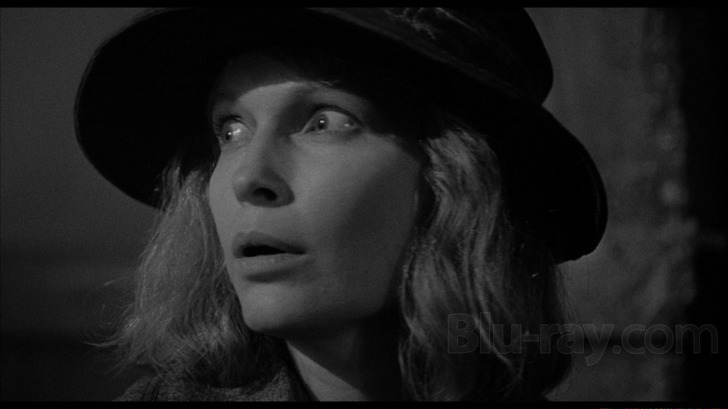
Shadows and Fog is presented on Blu-ray with an AVC encoded 1080p transfer in 1.85:1. Of all of Allen's black and white films, it's at least arguable that Carlo di Palma's lensing is his most evocative for the noted director, with whom he collaborated repeatedly. Allen and di Palma repeatedly reference Abstract Expressionist visual ideas, with deep chiarascuro lighting effects that deliberately evoke some of the most iconic motion pictures of an earlier era. Probably due to the fact that so much of the film is shrouded in darkness and/or dimly lit moments, speckling, notably white speckling, is more obvious than it might otherwise be. There's also a rather problematic sequence starting at circa 16:59 and lasting for about a minute and a half where it appears some kind of damage has occurred to the elements. There are repeated smudges which crawl through the imagery here, giving a quasi-flickering look. The grain field is quite heavy throughout the presentation, but the encode, while perhaps not optimal, has no major issues with resolution. Due to both the heavy grain and the dark ambience, many shots have a pretty soft appearance, though detail can still be quite commendable in close-ups. Black levels are equally commendable by and large (there's slightly variable contrast), and gray scale is nicely modulated, especially in some of the extremely moody "exterior" shots of the fog enshrouded village alleyways.
Shadows and Fog Blu-ray Movie, Audio Quality 
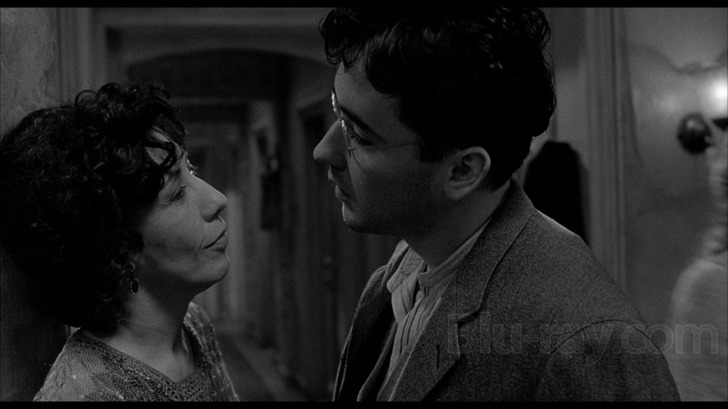
The vintage recordings of Kurt Weill that infuse Shadows and Fog can sound slightly boxy and/or tinny at times (as befits their sources), but otherwise the DTS-HD Master Audio Mono track is surprisingly full sounding, offering good support for the film's dialogue and occasional amibent environmental effect. There's nothing very showy about either the sound design or its presentation, but what's here is solid and problem free.
Shadows and Fog Blu-ray Movie, Special Features and Extras 
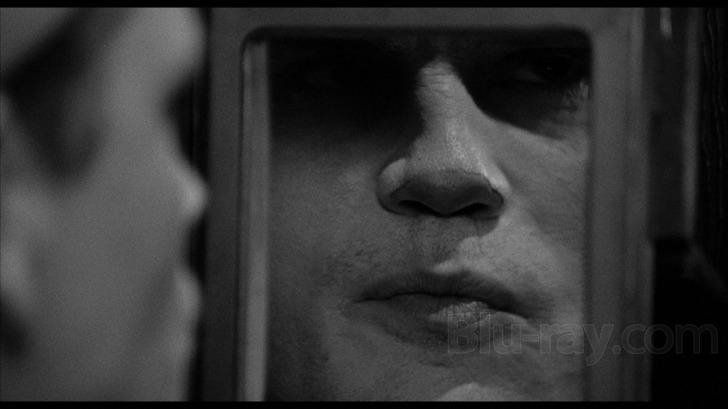
- Isolated Score Track is presented in DTS-HD Master Audio 2.0.
- Original Theatrical Trailer (480i; 1:06)
- MGM 90th Anniversary Trailer (1080p; 2:06)
Shadows and Fog Blu-ray Movie, Overall Score and Recommendation 
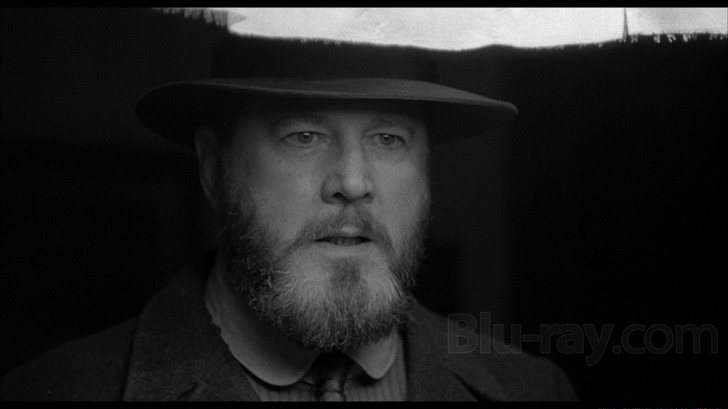
Shadows and Fog is certainly one of Allen's more provocative efforts, but that doesn't easily translate into quantifiable "entertainment" value. The film is often quite haphazard feeling, and Allen's screenplay, while tangentially brushing up against any number of subjects the auteur tends to favor, is halting and not overly organic feeling, as if it were cobbled together more Frankenstein style than in Kafka's deliberately obfuscatory but cohesive way. Probably best appreciated as one of the more out there curios of Allen's long and varied career, Shadows and Fog at least has the distinction of being something different. There are some passing issues with video quality, but on the whole and with caveats about the film itself noted, Shadows and Fog comes Recommended.
Similar titles
Similar titles you might also like

A Midsummer Night's Sex Comedy
1982

Alice
Limited Edition to 3000 - SOLD OUT
1990

Bananas
1971

Broadway Danny Rose
1984

Everything You Always Wanted to Know About Sex *But Were Afraid to Ask
1972

Sleeper
The Woody Allen Collection
1973

Crimes and Misdemeanors
1989

Zelig
1983

September
1987

Radio Days
1987

Greener Grass
2019

Brewster McCloud
1970

Love and Death
1975

The Purple Rose of Cairo
1985

Stardust Memories
1980

Last Embrace 4K
Standard Edition
1979

La Cage aux Folles
Birds of a Feather
1978

Interiors
1978

Trans-Europ Express
1967

Parade
1974
